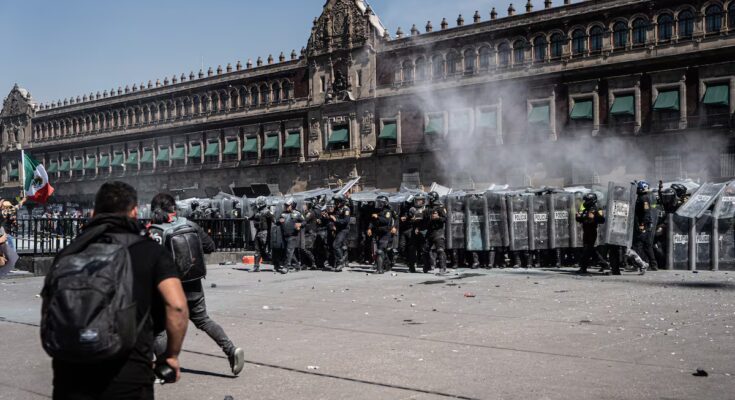The anti-government demonstrations over the weekend in Mexico have opened a wave of criticism towards the National Palace for the impetuosity of the public force in responding to the excesses of the demonstrators in a protest that was already born from social unrest due to the situation of violence in the country. The governing party, challenged by the needs of a widespread appeal in its instances and its protagonists, has tried at all costs to deactivate this drift of usury towards the Government. Morena’s heavyweights have closed ranks around Claudia Sheinbaum’s management and, in the last few hours, have come out to criticize the repression of the protests. Senator Adán Augusto López and deputy Ricardo Monreal, leader of the Mexican Congress, contrary to usual, appeared together to support the decisions taken by those in power. “It is an attack from the darkest part of the Mexican right, even with international participation,” the Senate leader said in response to the ferocity seen at the end of Saturday’s march. Luisa María Alcalde, national leader of Morena, joined the shelter’s embrace. “The loan sharks, conservative country sellers and the international right have hit a wall. The people of Mexico are many people and have many presidents,” was the response. The mobilizations were based on the request to stop the violence in Mexico, an appeal fueled by the assassination of the mayor of Uruapan, Michoacán, Carlos Manzo, who carried out the “Morena Out” proclamation.
The images of the police beating the demonstrators, together with others depicting the appeal in which, according to official data, 17,000 people participated, broke the government’s rhetoric according to which the demonstrators were the generators of the violence. The government had already discredited the call by linking it to a social media campaign featuring opposition actors. “Maybe there were some excesses,” said Adán Augusto, pressed by questions about the actions of the local police. “At least there were young people,” the coordinators insisted. “The parliamentary groups are united, here we are united”, underlined the morenists.
The opposition, in parallel, capitalized on the criticism and contested the behavior of the authorities. “They behave like an organized crime cartel! They gassed girls and boys! They beat young and old! They raped women! They have students as political prisoners!”, launched the leader of the PRI, Alejandro Moreno. The attack was uniform and rekindled old enmities. “Violence will never be the solution to solving the country’s problems. The state should not have exercised any act of force against those who participated in the march,” said PAN leader Jorge Romero. The Citizens’ Movement (MC), the third opposition bloc, was not left behind. “I am very sorry for the loss of those who are capable of justifying these excesses today. It is simply unacceptable,” the leader of the Orange party, Jorge Álvarez Máynez, posted on his social networks.
The ruling party named those responsible for the march. In the malnourished list of conveners, divided between generation Z and citizens of all generational classes, well-known figures appeared. Entrepreneur Claudio Morena’s unit was the first trench from which the governing party cut short. “Tell President Sheinbaum that she will not be alone and that we will support her and her public activities,” launched Monreal.



